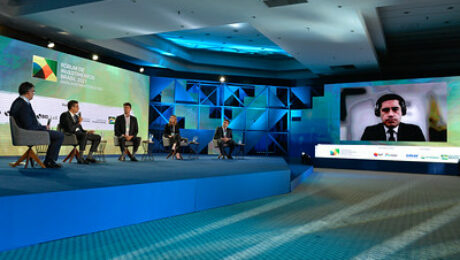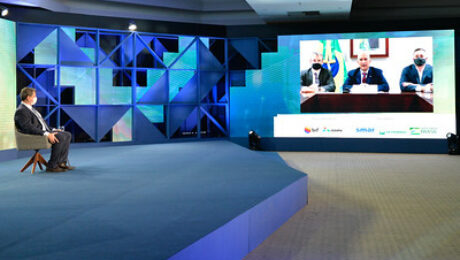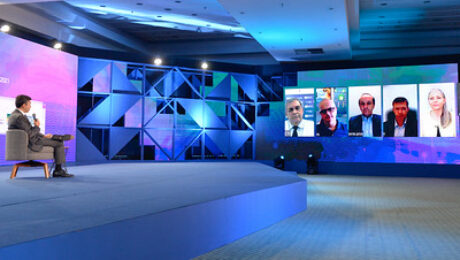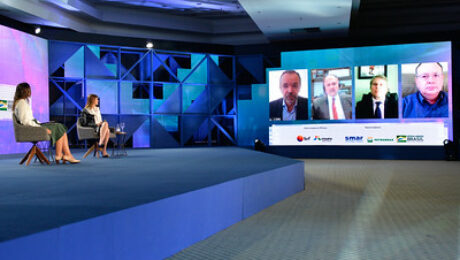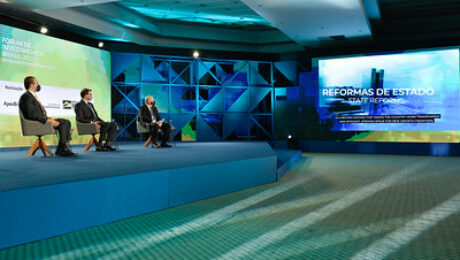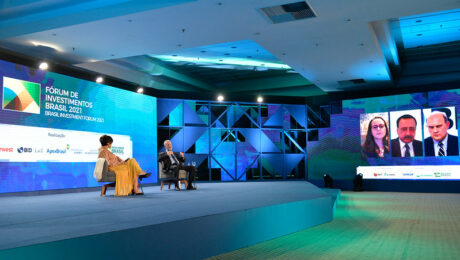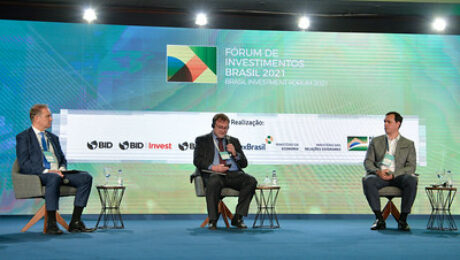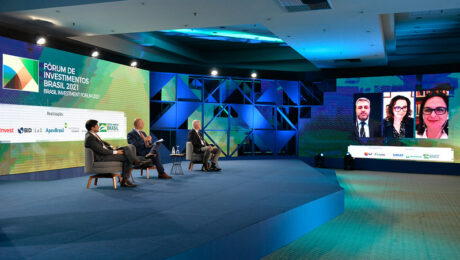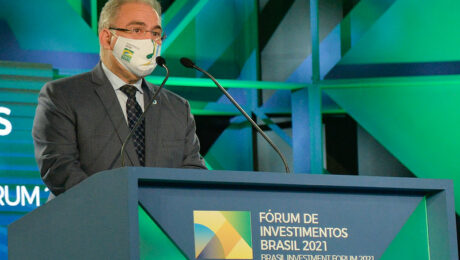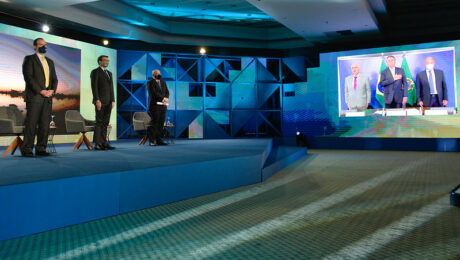Panel 1 – Global economy resulting from the “new normal” is more flexible and sustainable
During an online panel held at the Brasil Investment Forum (BIF) 2021, speakers pointed out challenges and perspectives for a post-pandemic economy
A new global economy is underway and with growth prospects for the post-pandemic period. It is characterized by new labor relations and an even more attentive look at the planet’s sustainability. The new scenarios and the opportunities and expectations for the future were discussed by representatives from the Brazilian government, international institutions, and civil society, on Monday (May 31), in a panel during the fourth edition of the Brasil Investment Forum.
In the panel “The Post-Pandemic World: Systemic Risks, Governance Challenges, and the New Normal”, mediated by the Secretary of Foreign Trade and Economic Affairs of the Ministry of Foreign Affairs (MRE), Ambassador Sarquis José Buainain Sarquis, governance challenges and systemic risks that involve this new global economy were pointed out. “It is a panel that deals with the global economy, the economic recovery, and the responses of different countries in the face of the crisis we are still experiencing,” pointed out Sarquis. The ambassador recalled, throughout the panel, that “on the path of reforms we have chosen, Brazil has managed to remain among the countries that attract the most foreign investments”.
The President of the Central Bank of Brazil, Roberto Campos Neto, recalled that one of the consequences of the crisis caused by the Covid-19 pandemic has been to question the way global value chains operate. “Global value chains have been responsible for taking hundreds of millions of people out of poverty line in emerging countries. It is an important issue, and it is what society has demanded – that this recovery be inclusive and sustainable,” he assured.
Campos Neto also talked about credit growth in 2020, when Brazil grew 16% – according to him, the highest growth in the emerging market. “In terms of liquidity, the Central Bank of Brazil released 15% of GDP. In terms of capital for the banking system, 20% of GDP. It was the biggest release in the whole emerging world as well. And we look at the month of April and see that credit continues to grow. And, most important, the default rate, which everybody expected to be quite high, has come in relatively low so far, very close to the minimums,” explained the president of the Central Bank.
The data highlighted by Campos point to a positive balance for Brazilian development which, according to the President of the Brazilian Development Bank (BNDES), Gustavo Montezano, must be sustainable. “The function of a development bank is to make sustainable development, socially, environmentally and economically. The crisis has shown that there is not one of them without the others. When we talk about development, it goes through this balance. There is no investment today that is not socially and environmentally appropriate”.
Sustainability was also an issue addressed by the President of the Central Bank of Brazil, in line with technological innovation, both considered the bases for the growth of the economy. “A whole part of technology comes together with our agenda, which is basically related to the theme we mentioned: inclusion and sustainability. There is nothing more inclusive than technology and digitalization. So you have a strong agenda in that sense, with opening markets through technology. We had launches like the PIX system, we have projects for currency regulation. In general, we are optimistic with the growth, with the way the economy is reacting and with the possibility of a stronger reopening in the second semester”, highlighted Roberto Campos Neto.
The Brazilian results and efforts pointed out during the panel show the relevance of Brazil in the international market. According to the Vice President of Countries of the Inter-American Development Bank (IDB), Richard Martínez, “Brazil has a lot of potential to develop in the foreign market. We see it as a country with great potential for productivity. Brazilians are visibly engaged”.
Companies
The economic recovery is going through a vigorous process. This is what the Director of Macroeconomics at Santander Brasil, Ana Paula Vescovi, points out. “A year ago, we discussed how to sustain active companies to get through this period. Today, we are talking about a very fast recovery. It is important to understand what it derives from: to place monetary incentives and stimuli so that both companies and families can make this transition,” said Vescovi, also recalling that “there is a need to move forward with reforms and stabilize the Brazilian macroeconomy. And she added: “Brazil has already taken advantage of the time for reforms and approved important improvements in the regulatory frameworks”.
Brazilian economic growth has a strong drive in agribusiness, a theme discussed during the panel by BRF’s Global CEO, Lorival Luz, who emphasized: ” In Brazil, at no time has agribusiness stopped producing, supplying food, not only for the Brazilian population, but it has continued exporting and serving the foreign market. This is fundamental to sustain the Brazilian trade balance”.
Brasil Investment Forum (BIF) 2021
The Brasil Investment Forum (BIF) 2021 offered three more panels on its first day: on industry, energy, and Foreign Direct Investment (FDI). The presentations were made by qualified speakers, who shared their knowledge and helped identify opportunities for the country. If you would like to follow the publications related to the other debates at BIF, Brazil’s largest investment event, please visit the website www.brasilinvestmentforum.com.
The Brasil Investment Forum (BIF) – organized by Apex-Brasil, the Inter-American Development Bank (IDB) and the Brazilian Government – is the largest event for investment attraction in Latin America. The 2021 edition, which was held online, brings together Brazilian authorities and executives from major companies to discuss opportunities in the sectors of infrastructure, energy, agribusiness, technology and innovation.
- Published in News
Keynote Session 2 – Investment opportunities in the infrastructure sector are presented at BIF 2021
The Chief Minister of Staff and the Minister of Infrastructure highlighted the GDP growth in the first quarter of 2021 and the concessions and privatization projects underway
During the Keynote Session on Tuesday, June 1st, the Minister of Infrastructure, Tarcísio de Freitas, and the Chief Minister of Staff, Luiz Eduardo Ramos, highlighted the legal security, the sustainability of projects and the economic improvement of the country, while addressing investors interested in Brazilian assets. The meeting was part of the Brasil Investment Forum (BIF) 2021, organized by Apex-Brasil, the Inter-American Development Bank (IDB) and the Brazilian Government.
The 1.2% growth of the Gross Domestic Product (GDP), in the first quarter of the year, was mentioned by Minister Tarcísio de Freitas. “Look for our projects. What is to come is really big, the size of Brazil”, he highlighted, complementing that the Brazilian Government has set a great investment program, which already made possible 70 auctions in the infrastructure sector.
“Brazil has held auctions of highways, ports, airports, and railroads. We are back to investing in railways. We are transforming our transportation matrix, which will be much more efficient in a few years”, celebrated Freitas.
On the scope of opportunities for new investments, the Minister of Infrastructure mentioned concession, privatization and auction processes for the Presidente Dutra highway, 18 airports – including Viracopos, in Campinas (SP) –, ports in Espírito Santo and São Paulo and railroads. He added: “The auction of the railroad between Sinop (MT) and Mirituba (PA) has enormous potential and will become the largest regulator of tariffs in Brazil. It has the power to bring the tariff down and make our producers extremely competitive”.
The Chief Minister of Staff, Luiz Eduardo Ramos, also emphasized the resumption of economic growth and the effort to reinvigorate international investments. “The moment is very favorable. Those who don’t invest now in Brazil, next year will be very sorry”, warned the minister, while enumerating the governmental actions to improve the business environment. For Ramos, there are windows of opportunity being opened from the process of Brazil’s accession to the Organization for Economic Cooperation and Development (OECD), which is underway and will remove barriers for foreign investments. “The country has pursued an improvement in business environment for FDI attraction, the insertion in global chains, the opening of new markets, the adoption of international standards for public policies, and the maintenance of solid institutions with good governance,” said the minister.
- Published in News
Panel 6 – MCTI and entrepreneurs discussed investments for startups and unicorns
On the last day of the Brasil Investment Forum (BIF) 2021, the sanction of the legal framework for startups was celebrated
The perspectives for market growth and the anticipated celebration of the sanctioning of the legal framework for startups, expected to happen this month, set the tone for the panel “Innovation: Startups and Unicorns: investment opportunities in mobility, finance, health, and security”, held on Tuesday (June 1st) as part of the Brasil Investment Forum (BIF) 2021, an event organized by Apex-Brasil, the Inter-American Development Bank, and the Brazilian Government.
About the legal framework, the Secretary of Entrepreneurship and Innovation of the Ministry of Science, Technology and Innovation (MCTI), Paulo Alvim, highlighted that it is a very significant advance, for being a collective construction that involved more than 70 public and private institutions, in the last four years. “Startup is the business model of the 21st century. A major advance we achieved is to create legal conditions, favorable business environments for startups to emerge and develop,” Alvim pointed out.
With the participation of private companies, the event was moderated by the chief of the President’s Office of Apex-Brasil, Igor Brandão, who classified the dynamics of the Brazilian market in this segment as sensational. Brandão mentioned the growth of startups in Brazil, which tripled in the last five years. “We went from 4,000 on average to 14,000 this year.” In relation to unicorns, he highlighted that 18 have been mapped and another 12 should emerge in the next reports.
Solutions for the future
Speaking about prospects for the future, the Managing Partner of Redpoint eVentures, Anderson Thees, said he was optimistic about the segment, and recalled that the innovation industry is seasonal and cyclical. “We have learned over time that most great companies and success stories are created during and immediately after major crises. The current crisis is global, and unprecedented. We are clear that the solution will be digital. Few times will we have such an obvious moment to start great companies,” emphasized Thees.
The CEO of IDB Lab (IDB innovation lab), Irene Arias, stated that the solutions of the future need to be designed with interoperable systems and security networks in mind. She also defended the need for the responsible use of data in Artificial Intelligence and invited entrepreneurs to contact the institution she represents. Arias also made a warning: “This digital emergency needs to be very deliberate to make room for correct models, otherwise we will have problems in society”.
The president of the Sociedade Beneficente Israelita Brasileira Albert Einstein, Sidney Klajner, pointed out the need to “create an appropriate condition, both regulatory and attractive, for the country to increasingly attract investors. Klajner also stated that a digital transformation in society is necessary, and mentioned examples of telemedicine projects that allow medical care to indigenous communities and regions far from large urban centers, as well as virtual visits by medical specialists to ICUs in hospitals with specialized care deficiencies. And he concluded: “5G is a giant opportunity for the use of technology”.
The vice president of Technology at Dasa Group, Danilo Zimmermann, said that the pandemic came to accelerate and ratify solutions, as well as demonstrate that whoever has the best technology – turbocharged with data, machine learning and experts – walks to really lead to a better experience. “It’s time to start new projects. If you still have projects on standby, it’s time to accelerate. We will continue to invest in digital transformation and innovation,” Zimmermann assured.
Legal framework for startups The vote on Complementary Law Project 146/19 was concluded by the Senate on May 11, and was forwarded to presidential sanction, expected to take place this month. According to the bill, startups can be classified as companies and cooperative societies active in innovation applied to products, services or business models; and with gross revenues of up to R$16 million in the previous year and up to 10 years of enrollment in the National Register of Corporate Taxpayers (CNPJ).
- Published in News
Panel 5 – Infrastructure: fertile field for foreign investments
During the fifth panel of the Brasil Investment Forum (BIF) 2021, specialists presented the opportunities and the current Brazilian scenario for investments in infrastructure,
a sector that has a wide room for expansion
Infrastructure is a key factor for Brazil’s socioeconomic development. And the sector was the specific theme of the fifth panel of the Brasil Investment Forum 2021, the largest event for investment attraction in Latin America. The idea was to discuss opportunities for investors, even in a pandemic context. This is because, even in atypical times, due to the Covid-19 pandemic, investment possibilities in Brazil keep emerging. This is due, particularly, to the strengthening of the economy in recent years and the recent actions taken by the Brazilian government.
So far, the Council of the Ministry of Economy’s Investment Partnerships Program (PPI) has delivered more than 200 projects with a wide variety of assets, with an estimated investment of US$ 132 billion. For 2021, 129 assets are expected to be presented to the private sector, with estimated investments of more than US$ 76 billion.
The Brazilian Government’s privatization agenda, added to the set of activities related to infrastructure, has great room for expansion – capable of directly impacting the Brazilian productive chain. The subject was promoted by the Brazilian Trade and Investment Promotion Agency (Apex-Brasil), the Inter-American Development Bank (IDB) and the Brazilian Government, organizers of the Brasil Investment Forum (BIF). This is the fourth edition of the event and the first one that was held entirely online.
Infrastructure as a ground for investment
Infrastructure involves segments such as railroads, highways, ports, airports, sanitation, and telecommunications, among others. In the panel “Infrastructure: Sector and regional opportunities for foreign investment”, the specialists indicated how the sector is fertile ground for new opportunities for the country. “We have a protagonist role in what we call investments in governance, sustainability and clean energy”, pointed out the panel’s moderator and Secretary of Development, Planning and Partnerships of the Ministry of Infrastructure, Natália Marcassa.
The Minister of Communications, Fabio Faria, pointed out that Brazil has wide opportunities for investments in the sector. “We have an audience, a high-level audience. It is interesting for our infrastructure. We never stop working hard to deliver privatizations and concessions, to keep the economy sustainable and attractive for the private sector”.
Faria also pointed out that the portfolio is working to solve the connectivity offer to the population, highlighting 5G. “It is a challenge to fill the communication gap, while 5G is emerging. 4G was fundamental, but 5G is designed for the industry, to connect the supply chain and increase productivity,” he explained, adding that a total change in Brazil’s communications system was foreseen. “We will have the benefit of a new regulatory environment, making everything more predictable and with legal security,” concluded the minister.
The Special Secretary of the Investment Partnerships Program (PPI), Martha Seillier, addressed the importance of destatization and privatizations. “The PPI is a federal program that facilitates the coming of private investments essentially for infrastructure, but also in the sense of a greater opening of markets and an important agenda of privatizations of companies, which is this important work of destatization, which is intertwined with the PPI”.
According to Seillier, Brazil maintains intense and daily dialogue with investors who are in the country and intend to invest here. “We can proudly say that Brazil today has probably the largest number of assets to be offered to the private sector, in the most different sectors, such as road concessions, railway projects, airports, energy projects, auctions in the mining sector, PPPs for daycare centers, hospitals, public lighting, prisons, and telecommunications, such as the 5G auction,” he pointed out..
For IDB Invest CEO James Scriven, reforms are necessary for industrial growth. “For industry to grow, reforms are needed to address global changes and create a more inclusive economy. For Brazil, its location is competitive and there is great potential for investment in infrastructure,” said Scriven.
Investments in infrastructure are the basis for a future of development in the country. On this, the Vice President of the Private Sector of the Development Bank of Latin America (CAF), Jorge Arbache, pointed out: “The future in the 21st century is extremely challenging, because technologies and innovations have been assuming an extremely determining condition for the productivity and competitiveness of companies and countries. And one of them is the digital economy: it is absolutely central, whether as an input for household consumption, or as a critical and vital instrument for value chains, to enable productivity and competitiveness”.
About BIF
The second day of the Brasil Investment Forum (BIF) 2021 offered four panels with qualified debates on strategic issues for the country. In addition to infrastructure, tables were held on innovation, agribusiness and the regulatory agenda. To follow the publications related to BIF, access the website www.brasilinvestmentforum.com.
- Published in News
Summary 1st day – Innovation environment was the mark of the Brazil Investment Forum (BIF) 2021
For the first time in an online edition, the investment forum brought qualified discussions aimed at investors.
An innovation environment with the potential to generate more business, promoting sustainability and adaptation in the context of the Covid-19 crisis. This was the feeling during the first day of the Brasil Investment Forum – BIF, held online on Monday,
May 31. The President of Brazil, Jair Bolsonaro, was the highlight of the first day, participating in the opening of the fourth edition of the largest forum for investment attraction in Latin America, held fully online for the first time.
The international event kicked off with the participation of more than 6,000 registered participants from 101 countries. The expectation was that, throughout its two-day duration, BIF would create unique conditions for investment decisions, the development of partnerships and the expansion of operations already in place in Brazil. During the event, 60 investment projects were presented to the participants, with an estimated value of US$ 72.5 billion, and the expectation was that, based on the forum,
US$ 50 billion in investments will be announced between 2021 and 2022, with the potential to generate 22,000 jobs. The data was highlighted by President Jair Bolsonaro in his opening speech.
The entire program of the forum was broadcast online, and matchmaking services were also offered to the participants, via an online platform. Investors had access to the presentation of public and private projects in Brazil with high potential attractiveness. Since the first day of the event, the networking system in the online platform was the stage for meetings with top-level federal and state government officials.
In addition to the meetings promoted by this edition, BIF’s schedule included a keynote session, two parallel sessions, and four panels, bringing together speakers who shared knowledge that can help identify challenges, advances, and opportunities. The idea was to promote partnerships and project future scenarios for Foreign Direct Investments (FDI) in Brazil.
The opening of BIF 2021 also counted on the presence of the Brazilian Minister of Foreign Affairs, Carlos Alberto França; the President of the Inter-American Development Bank (IDB), Maurício Claver-Carone; and the President of the Brazilian Trade and Investment Promotion Agency (Apex-Brasil), Augusto Pestana.
President Jair Bolsonaro emphasized that the current government is committed to reforms and structuring projects to reduce the “Brazil cost”: “It is about refining norms and policies to improve the business environment. For this, we design tax solutions that ensure macroeconomic stability in a context of budgetary challenge.” Also according to the president, the Brazilian government plans, “at the same time, greater openness and economic freedom, more competition and greater stimulus to private initiative, while reserving to the State the role it should play in several public policies essential to development”.
The Brasil Investment Forum (BIF) was organized by Apex-Brasil, the Inter-American Development Bank (IDB) and the Brazilian Federal Government. The forum is officially sponsored by BRF and Itaipu Binacional, and sponsored by Petrobras and Smar Technology Company.
Qualified debate for investors
In the first panel of this edition of BIF, the organizers brought an inevitable debate: the “post-pandemic world”. In the session involving the global economy, the systemic risks and governance challenges were discussed, as well as the “new normal”. The panel brought reflections about a new economy, new labor relations, the acceleration in digital means of payments, and a new look at the planet and its sustainability. “Brazil has a lot of potential to develop in the foreign market. We see Brazil as a country with great potential for productivity. Brazilians are visibly engaged”, pointed out the Vice President of Countries at the Inter-American Development Bank (IDB), Richard Martínez.
The second panel, “Industry: Impacts of digitalization, servitization, IoT and Industry 4.0”, discussed the revolution in the industrial market, which occurs constantly and quickly, transforming not only the way to produce, but also the way companies relate to customers and suppliers. The meeting opened space for the presentation of strategies that aim to increase, in the coming years, the use of new technologies, thus creating new business models. One of the panel’s participants, the Special Secretary of Productivity, Employment and Competitiveness of the Ministry of Economy, Carlos da Costa, highlighted that Brazil is investing in actions aimed at technological development.
According to Costa, the national industry has endured a long period of falling productivity and a reduction in the segment’s share of the national Gross Domestic Product (GDP), but public policies in the field of technology are starting to show results. “Within the digital agenda, we are implementing new regulatory frameworks and developing the foundations of Industry 4.0,” he said.
The role of Foreign Direct Investment (FDI) and the reform agenda in Brazil’s
post-pandemic growth was the theme of BIF’s third panel. According to the head of the Investment Division of the Organization for Economic Cooperation and Development (OECD), Ana Novik, the government’s efforts to accelerate the necessary reforms and privatizations are configured as positive points to attract more and more Foreign Direct Investment. “We have to look at foreign investments and the growth potential of the country. It is very important to increase FDI because if you don’t have direct investment, you won’t have sustainable investment,” Novik stressed.
The high-level panels ended with a discussion about the energy transition in Brazil, covering the importance of renewable energy and FDI. Brazil, which stands out in the use of renewable energy, presents promising elements: a vast offer of clean sources, still with great potential to be exploited, and a growing consumer market. This was pointed out by the Minister of Mines and Energy, Bento Albuquerque, who highlighted the positive results of the RenovaBio program and the Brazilian history in the implementation of public policies for the segment: “Our transportation matrix is considered the cleanest in the world. An initiative that began 50 years ago and is being improved because biofuels and bioenergy policies are an international reference, and we can be proud of this”.
The Brasil Investment Forum continued until Tuesday (June 1st) with an extensive program. The participants followed debates on sectors and strategic themes of society, such as infrastructure, innovation, agriculture, and the regulatory agenda. To learn more about the event, the speakers, and the program, please visit www.brasilinvestmentforum.com.
Check out the links to watch BIF 2021 panels:
• 9 am – Keynote Session: https://click.apexbrasil.us/s1br
• 11 am – Panel 5 – Infrastructure – Sectoral and regional opportunities for foreign investment : https://click.apexbrasil.us/s1br
• 11 am – Panel 6 – Innovation – Start-ups and Unicorns: investment opportunities in transportation, finance, health, and security : https://click.apexbrasil.us/s2br
• 2:30 pm – Panel 7 – Agribusiness – The 3 I’s of Agriculture: Innovation, Infrastructure and Green Instruments: https://click.apexbrasil.us/s1br
• 2:30 pm – Panel 8 – Regulatory Agenda – The Improvement of the Investment Environment in Brazil : https://click.apexbrasil.us/s2br
Service
To send questions and other requests : inpacto.apexbrasil@inpacto.co
Apex-Brasil – Press Office:
Vera Stumm: +55 (61) 99631-1979
Jéssica Barz: +55 (51) 98262-0964
- Published in News
Panel 4 – BIF 2021 discussed expansion of investments in renewable energy
Minister of Mines and Energy and representatives from the IDB and the private sector participated in a panel on energy transition at the Brasil Investment Forum (BIF) 2021
Brazil is expecting “strong expansion” in the biofuels sector over the next few years, with investments that may reach R$ 400 billion. The announcement was made on Monday by the Minister of Mines and Energy, Bento Albuquerque, during his participation at the Brasil Investment Forum (BIF) 2021. The event, held on May 31 and June 1st, was organized by the Brazilian Trade and Investment Promotion Agency (Apex-Brasil), the Inter-American Development Bank (IDB) and the Brazilian Government.
The minister was part of the panel “Energy transition in Brazil: the importance of renewable energy and foreign direct investment”, alongside representatives of the IDB and private companies operating in Brazil. He highlighted the positive results of the RenovaBio program and the Brazilian history in the implementation of public policies for the sector: “Our transportation matrix is considered the cleanest in the world.
An initiative that began 50 years ago and is being improved because biofuels and bioenergy policies are an international reference, and we can be proud of this”.
The meeting was moderated by the CEO of ABEEólica, Élbia Gannoum, who pointed out the investment opportunities available in Brazil. For her, the perspective of the regulatory apparatus, highlighted by the minister, “is very good for investors. “We realize that, with this wealth, Brazil has many opportunities and we can think of opportunities beyond electricity,” emphasized Gannoum.
External investments
Climatescope 2020, conducted by BloombergNEF, shows Brazil as the 3rd most attractive country to invest in the implementation of renewable sources. Those opportunities were discussed by the President of Equinor Brazil, Veronica Coelho, the CEO of EDP Brazil, João Marques da Cruz, and the Manager of the Infrastructure and Energy Sector at IDB, Jose Agustín Aguerre.
According to Aguerre, the possibilities for innovation and job creation are great, and include the development of new products for consumers. He also highlighted the opportunities in the decarbonization of public transport, in individual electric cars, and in actions for the development of energy efficiency. The Amazônia Legal program and the financing line for photovoltaic energy that is being worked on with the Brazilian Development Bank (BNDES) were also mentioned.
The CEO of EDP Brazil, João Marques da Cruz, presented projects that the company develops in the country and spoke about the interest in investing in renewable energy. “We must find balances that are in accordance with the energy transition, with a favorable evolution”, he said. Veronica Coelho, from Equinor, mentioned current investments in the states of Ceará, Rio Grande do Norte, and Rio de Janeiro, and emphasized that the company has sought to invest in projects related to hydrogen and carbon capture, among others. According to her, the company, in fact, has as part of its ambition to be a leader in the energy transition process.
- Published in News
Panel 3 – Brazil stands attractive for foreign investments
Panelists at Brasil Investment Forum (BIF) defend the role of Foreign Direct Investments in Brazil post pandemic.
On Monday (31), The Brasil Investment Forum (BIF) opened room for an in-depth discussion with high-level participants, on the importance of Foreign Direct Investment (FDI) for Brazil’s post-pandemic growth.
The setting for the forum could not be more appropriate: BIF is considered the largest event for foreign investment attraction in Latin America. The whole program of the event was based around qualified discussions on the opportunities found in Brazil and its repositioning as a key player in global economy.
During the panel “FDI: Growth in Brazil Post-Pandemic: the role of Foreign Direct Investment and the reform agenda” representatives from the Brazilian government, international institutions and civil society discussed the role of investments for the country’s sustainable and balanced growth.
The approval of the Social Security reform and the government’s efforts to accelerate the tax reform and privatizations are positive aspects to further attract FDI.
And Brazil’s track record reflects its ability to attract interest abroad: according to the United Nations Conference on Trade and Development (UNCTAD), the country received US$ 75 billion in foreign investments in 2019, up from US$ 60 billion in 2018. With the increase, Brazil now ranks fourth among the top FDI destinations in the world.
The Director of Corporate Management at Apex-Brasil, Roberto Escoto, moderated the panel and took the opportunity to list the country’s potential and measures related to investment attraction. “One of the reasons why investors seek Brazil is the size of our domestic market – 210 million people. But not only that. Brazil serves as an export platform for other countries, especially in Latin America. So, there is no doubt that the country is important for attracting investments for the entire region”, he emphasized.
Escoto highlighted the sanitation legal framework as an “example of initiatives that are being taken to make investment more inclusive and more sustainable”. For him, “Brazil can absorb billions of dollars in sanitation investments, and this certainly will improve the living conditions of millions of Brazilians who still do not have access to drinking water and sewage”.
For his part, the Special Secretary for Foreign Trade and International Affairs of the Ministry of Economy, Roberto Fendt, recalled tools already adopted by the government that are capable of improving the business environment and, consequently, the formal labor scenario, social inclusion and adherence to environmental standards.
“The guidelines offer principles and standards that seek to improve standards, covering a large number of areas, such as labor relations, human rights, combating corruption, environment, taxation, and competition,” explained Fendt. The secretary also mentioned that the Brazilian government has participated, since 1977, in the Investment Committee that works within the Organization for Economic Cooperation and Development (OECD).
Also present at the panel, the head of the OECD’s Investment Division, Ana Novik, affirmed that “Brazil has the profile to become a member of the OECD”, since it is “firmly engaged in activities that are prerequisites for this, and is on the right path”. Novik reminded that economic relations must bring social benefits. And this concern relates to FDI in a positive way. “We have to look at foreign investments and the growth potential of the country. It is very important to increase FDI because if you don’t have direct investment, there will be no sustainable investment,” he concluded.
The Vice President for Sectors and Knowledge of the Inter-American Development Bank (IDB), Benigno López, reinforced that Brazil can become a leader in this agenda and will take a step forward by making important reforms. And, confidently, he predicted that “the investments will start flowing, since Brazil has everything necessary. These are opportunities that happen once in a lifetime and this is the moment”.
Investors in Brazil
With a long history of investments in Brazil, the general manager of Siemens Energy Brazil, Andre Clark, defended Brazil as a “global destination competitor for investments in innovation”. For him, “the FDI concept has changed, countries compete for pension funds as well as for companies. No longer for the domestic market, but for their projection as an export platform for technology, products, and services to the planet. We no longer think of direct investment exclusively for local markets”.
In the investor’s view, “innovation occurs in a network, within an ecosystem, generally global, and increasingly closer to where the problem is located”. According to Clark, “Brazil has enough scale and size to reach the whole planet”.
Bravo Motors CEO Eduardo Muñoz reported that he found a positive environment in the country. “We found a very favorable ecosystem in Brazil, with a very large market, and an almost fundamental strategic geopolitical positioning for our arrival. This made it so that we are here today, not only with the support from the Federal Government and
Apex-Brasil, but also from the state and the municipality. We are very happy to be here”, he celebrated.
Muñoz thanked the invitation to participate in BIF and reaffirmed the right choice of Bravo Motors to install in Brazil. “The country is having a very important economic opening and reducing inefficiencies in the economy. We work hand in hand with
Apex-Brasil”, he affirmed. He also pointed that the moment is unprecedented in terms of productivity and a new industry, called “Industry 4.0”, characterized by changes in the energy matrix, in the mobility system, and in communications, among others. “The great challenge we have today is precisely how we take advantage of all this value and productivity that will generate trillions in new economic resources, in the transformation of the old economy into the new, and of old jobs into new ones. That is where the challenges lie. Without a doubt, it is an exciting time in the world. We are going to experience a very different world. I just hope we make the right decisions to make it much better,” concluded the CEO.
Brasil Investment Forum (BIF)
BIF is organized by the Brazilian Trade and Investment Promotion Agency (Apex-Brasil), the Inter-American Development Bank (IDB) and the Federal Government. This fourth edition of the investment forum takes place for the first time fully online. The event provides a platform where participants from all over the world can access its content, in different languages.
On the first day of the Brazil Investment Forum (BIF), qualified speakers shared their knowledge and helped identify challenges and opportunities for the country. Three other panels were held throughout the day, adding discussions about the global economy, industry, and energy. To follow the publications related to BIF, the largest investment event in Brazil, visit www.brasilinvestmentforum.com.
- Published in News
Panel 2 – Brazilian Government and companies discuss access to new technologies at BIF 2021
The advances, challenges and opportunities of consolidating digital business models in Brazil were the theme of the panel “Industry – Impacts of Digitalization, Servitization, IoT and Industry 4.0”, held on Monday (31), as part of the Brasil Investment Forum (BIF) 2021. The participants agreed that the adoption of new technologies and digital transformation are key to development.
The Special Secretary of Productivity, Employment and Competitiveness of the Ministry of Economy, Carlos da Costa, stressed that Brazil is taking initiatives seeking technological development to improve the country’s business environment. According to him, Brazilian industry endured a period of falling productivity and a reduction in the segment’s share of the national Gross Domestic Product (GDP), but public policies in the technology area are starting to show results. “Within the digital agenda, we are implementing new regulatory frameworks and developing the foundations for Industry 4.0,” he said.
Costa also mentioned some outstanding actions to encourage this technological development. Among them, the development of suppliers, the training of micro and small companies and the repositioning of the Brazilian Agency for Industrial Development (ABDI), which now has the digitalization of the industry as its focus.
Panel moderator, the President of ABDI, Igor Calvet, pointed out that Brazil is already experiencing this digitalization. “The adoption of technologies in the productive process, the government’s view on this process, the legislative measures that are being taken, and the way companies are positioning themselves on a daily basis show that this is already a reality,” he said.
The Executive Director of Digital Transformation and Innovation at Petrobras, Nicolás Simone, presented the digital transformation strategy of the institution. The goal, he said, is to make the company “less bureaucratic” and continue to invest in innovation, with actions such as the purchase of supercomputers, and the improvement of professionals. For Simone, “every digital transformation takes place through people; it is also a cultural transformation”.
Companies
The President of IBM Brasil, Katia Vaskys, reinforced the country’s role as one of the most attractive destinations for foreign investments and highlighted that Brazil was the first country to host an IBM subsidiary outside the United States. “The technology industries have a fundamental role in the construction of open business models that allow the digital inclusion of society. Brazilian economy is ready to continue investing in digitalization and to work with a smarter, more open and inclusive environment”.
For the President and CEO of Scania Latin America, Christopher Podgorski, the brand’s 62-year history in Brazil is a sign of the development of transport in the country. “When we talk about digitalization and servitization, we are a true copy of our parent company in Sweden. We had the possibility of making the technology transference”, he highlighted. He also pointed out that the company is prepared for new business models based on new technologies. “We understand how the new business models will be in the future. We don’t know how it will end, but we will be positioned,” assured Podgorski.
Senior Policy Director of the Brazil-US Business Council (BUSBC), Renata Vasconcellos affirmed the country has done great work in the area of Artificial Intelligence, but reminded that there is still a lot of room for growth, citing telemedicine and rural connectivity as examples of segments to be worked on. “With the pandemic, we had a practical course on intensive digitalization. The challenge is to overcome outdated laws that can impact Artificial Intelligence, not only in Brazil, but worldwide”.
Brasil Investment Forum (BIF) The Brasil Investment Forum (BIF), organized by Apex-Brasil, the IDB and the Brazilian Government, ended on Tuesday (June 1st). It was attended by the Chief Minister of Staff, Luiz Eduardo Ramos; Minister of Economy, Paulo Guedes; Minister of Health, Marcelo Queiroga; Minister of Infrastructure, Tarcísio Freitas; Minister of Mines and Energy, Bento Albuquerque; and Minister of Agriculture, Livestock and Food Supply, Tereza Cristina, as well as dozens of authorities from the public and private sectors.
- Published in News
Keynote Session 1 – Ministers expect an increase in foreign investments in Brazil in 2021
The Minister of Economy, Paulo Guedes, and the Minister of Health, Marcelo Queiroga, were optimistic during their participation in the first Keynote Session of the Brasil Investment Forum (BIF) 2021, on Monday.
During the first Keynote Session of the Brasil Investment Forum (BIF) 2021, held on Monday (31) the Minister of Economy, Paulo Guedes, stated that after a year with a priority focus on fighting the pandemic, structural reforms that will improve investment prospects and the recovery of sustainable economic growth are being taken up. “We have investments in the public sector and we want to become the largest border of international private investments in the world,” he said.
For Guedes, mass vaccination is the main economic policy that can be carried out now, and it is also the main health policy. “Vaccination will guarantee a safe return to economic activities,” he assured.
The minister also pointed out that the idea is to bring down the “Brazil cost”, starting with the approval of new laws and the implementation of specific measures to encourage private investment and strengthen the government’s role in attracting it. As an example, he mentioned the need to improve the business environment in the country and its rank regarding global competitiveness. “We must advance 30 to 40 positions in the world ranking”, anticipated the Minister of Economy.
During his participation in the event, the Minister of Health, Marcelo Queiroga, emphasized the area’s importance for Brazilian economy. According to him, Brazil spends 9.2% of its GDP on health. “The sector also has a strategic economic importance, with a growing participation in the total added value of the Brazilian economy, in the generation of income, and in the total number of jobs”, the minister pointed out.
Queiroga also encouraged the private sector to work together with Brazil: “In this moment of crisis, the sum of efforts and public and private resources are fundamental to overcome the challenges of the Covid-19 pandemic”.
BIF 2021
The Brasil Investment Forum (BIF) – organized by Apex-Brasil, the Inter-American Development Bank (IDB) and the Brazilian Government – is the largest event for investment attraction in Latin America. The 2021 edition, which was held completely online, brought together Brazilian authorities and executives from major companies to discuss challenges and opportunities in the infrastructure, energy, agribusiness, technology, and innovation sectors. The event took place on May 31 and June 1st.
- Published in News
Opening Session – With opening by President Bolsonaro, BIF bets on investments in the country
Organized by Apex-Brasil, the IDB and Brazilian Government, the online event brings together government authorities and CEOs from important multinationals.
Investments in Brazil just got a privileged stage, where the improvement of the business environment is the focus. It is the Brasil Investment Forum – BIF, which was opened by the President of Brazil, Jair Bolsonaro, on Monday (31). The fourth edition of the largest foreign investment in Latin America took place for the first time on an online platform. Given the context generated by the Covid-19 pandemic, the president’s speech and the attending authorities could be safely accessed online by thousands of registered participants from all over the world. The 2021 edition had more than 5,000 registered participants from approximately 100 countries. These are unprecedented numbers.
In his opening speech, President Bolsonaro highlighted Brazil’s competitive advantages, emphasizing that it is an attractive country for direct investments. “Brazilian economy has already resumed its growth and job creation. The participation of so many executives from relevant global companies in this event reflects the interest we share in seeing Brazil produce more and better.” Among the characteristics of the country, which is a major global player, are the solid investment environment, the huge domestic market, a vocation for innovation, large infrastructure projects, and the energy and agricultural potential. In addition, the region’s leading economy is still considered a gateway to Latin America.
Bolsonaro emphasized that the current government is committed to reforms and structural projects to reduce inefficiency in Brazil: “It is about improving norms and policies to enhance the business environment. To this end, we have designed tax solutions that ensure macroeconomic stability in a context of budgetary challenge.” Also according to the president, the federal government plans to reach, “at the same time, greater openness and economic freedom, more competition and greater stimulus to private initiative, while reserving to the State its proper role in the different public policies essential for development”.
The opening of BIF also had the presence of the president of the Brazilian Trade and Investment Promotion Agency (Apex-Brasil), Augusto Pestana, who stressed the importance of the event for presenting opportunities to global investors. “Brazil is a continental country, with business opportunities in all sectors of its diversified economy, in all its regions. It is an increasingly open economy, integrated to international markets – an economy that counts on a highly entrepreneurial and resilient private sector. (…) In short, the ideal destination, with its superlative numbers, for capitals in search of promising socially and environmentally sustainable projects. In addition to representatives from Brazilian government and civil society, the forum brings together some of the top global leaders from the private sector.
The president of the Inter-American Development Bank (IDB), Maurício Claver-Carone, also attended the first day of the international event. Claver-Carone welcomed the participants of the forum, shedding light on the relevance of an environment focused on attracting investment at a time when the world is still experiencing the effects of the downturn caused by a global pandemic. “I invite you, leaders, to invest in the Brazilian economy. We have, in the next two years, a lot to do. We have strong, robust partnerships, with sustainable and exponential growth. I believe that we will come out of this crisis much stronger than we went in, and that we will benefit from it.
Claver-Carone also stressed that he believes in the country’s economic power. “Brazil is one of the most promising and most active markets in the global economy, and the IDB is part of this. I am very proud to be here and to present Brazil as one of the countries with the greatest investment potential in Latin America. We will continue with our developments and business partnerships”.
The Brazilian Minister of Foreign Relations, Carlos Alberto França, pointed the country as a relevant articulator between the players in global economy. The forum becomes, in this regard, an event with the potential to mirror this articulation, indicating sectors of interest to investors. “The BIF is a unique occasion for frank and fluid dialogue between the government and investors about the future of Brazilian economy and the expectations, on both sides, about important themes that affect the country’s economic growth and competitiveness”. According to the minister, the “Brazilian government works for the opening of our economy, for the improvement of the business environment and for the transformation of Brazil into one of the most attractive countries in the world to invest”.
About the government’s policies on market opening, França reinforced that, with concessions and privatizations underway, “the State will be able to focus on the
public policies that Brazilian society much needs in the post-pandemic period, allowing private capital, domestic and foreign, to act as the driving force for growth in the areas of infrastructure, logistics and energy. “Our main goal is a robust and definitive integration of Brazil into global value-added chains,” he concluded.
The Brazil Investment Forum (BIF) is organized by Apex-Brasil, the IDB and the Federal Government, through the Ministries of Foreign Affairs and Economy. The event continued through Tuesday (Jun 1st). The Ministers of the Civil House, Luiz Eduardo Ramos; of Economy, Paulo Guedes; of Health, Marcelo Queiroga; of Infrastructure, Tarcísio Freitas; of Mines and Energy, Bento Albuquerque; and of Agriculture, Livestock and Supply, Tereza Cristina, as well as dozens of authorities from the public and private sectors are confirmed in the program.
Presence of strategic sectors
The fourth edition of the international forum highlights investment opportunities in strategic sectors of the economy, such as agribusiness, energy, infrastructure, innovation, and technology. In total, 60 investment projects were presented during the event, with an estimated portfolio of US$ 72.5 billion. The investments announced at the forum could reach US$ 50 billion for 2021 and 2022, an amount that has the potential to generate 22 thousand jobs. The announcement was made by the President of Brazil, Jair Bolsonaro.
To make this propitious scenario possible, BIF offers in-depth discussions in two keynote sessions, four parallel sessions, and in eight panels, which include themes related to the global economy, Industry 4.0, foreign direct investment, infrastructure, start-ups, and the regulatory and reform agenda, among others. In addition to the opportunities disclosed by government representatives and CEOs of relevant multinationals, BIF’s participants counted on presentation rooms for public and private projects in Brazil that have high potential for investment. The idea was to provide networking between those responsible for the initiatives and potential investors.
The event schedule is largely focused on identifying opportunities, in addition to promoting partnerships and projecting future scenarios for Foreign Direct Investments (FDI) in Brazil. In the last edition, held in 2019, 1,035 meetings were held, among more than 1,600 participants – most of them (67%) from the private sector. The third edition brought together representatives from 58 countries and 20 foreign ambassadors, as well as 37 sectors of the economy.
A Milestone in user experience
The Brazil Investment Forum 2021 brings in the unprecedented experience of a completely online experience. Complying with security protocols in face of a health crisis scenario, the forum organizers opted for this format, which enables virtual participation by attendants. The format allows to reach even more investors and entrepreneurs, expanding the event’s capacity to attract business.
“Through its own digital platform, this edition of the forum seeks to combine the security and practicality of virtual communication with the possibility of maintaining a broad and effective network of contacts and dialogues that has so marked this event in previous editions,” said Carlos França, Minister of Foreign Affairs. According to Apex-Brasil, virtual access to this year’s event, and especially to exclusive content in real time, is focused on innovation and user experience. Thus, there is a platform where participants from various countries interact with each other and access, in different languages, all the available content. To follow the news about BIF, access www.brasilinvestmentforum.com.
- Published in News

